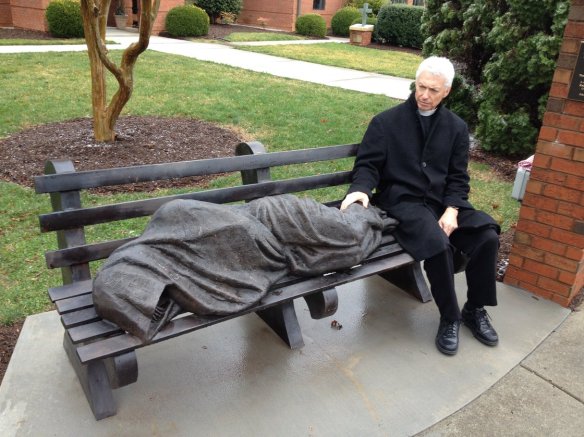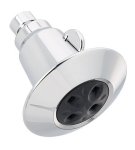
The Rev. David Buck sits next to the Jesus the Homeless statue that was installed in front of his church, St. Alban’s Episcopal, in Davidson, N.C. (NPR.org)
In the first post in this series, I looked at some obstacles I see to good policy development. However, I very much believe that there are opportunities ripe for collaboration between unlikely parties, like drugs.
Let me again note that not all ideals will be served here. For instance, these suggestions should appeal to fiscal conservatives, but not necessarily to social conservatives. That being said, there are examples of public policy which will save money, reduce crime, respect the dignity of those affected, and lead to positive social outcomes.
Some of these require more study before widespread implementation, but I believe there is enough data to warrant further inspection and at least merit experimentation.
The Issue: Housing the Homeless
From National Alliance to End Homelessness:
While circumstances can vary, the main reason people experience homelessness is because they cannot find housing they can afford. It is the scarcity of affordable housing in the United States, particularly in more urban areas where homelessness is more prevalent, that is behind their inability to acquire or maintain housing.
By the numbers:
- There are 610,042 people experiencing homelessness on any given night in the United States.
- Of that number, 222,197 are people in families, and
- 387,845 are individuals.
- About 18 percent of the homeless population – 109,132 – are considered “chronically homeless,”and
- About 9 percent of homeless adults- 57,849 – are veterans.
The Good News
Recent data indicates that we can largely solve homelessness in the United States and it’s fairly easy. The solution: provide stable housing to the homeless.
Again, from National Alliance to End Homelessness:
Studies have shown that – in practice, and not just in theory – providing people experiencing chronic homelessness with permanent supportive housing saves taxpayers money.
Permanent supportive housing refers to permanent housing coupled with supportive services.
- A study recent study followed the progress of the Downtown Emergency Service Center (DESC) in Seattle, WA. All the residents at this Housing First-styled residence had severe alcohol problems and varying medical and mental health conditions. When taking into account all costs – including housing costs – the participants in the 1811 Eastlake program cost $2,449 less per person per month than those who were in conventional city shelters, as described in the article from theJournal of American Medical Association.
- A cost study of rural homelessness from Portland, ME found significant cost reductions when providing permanent supportive housing as opposed to serving the people while they remain homeless. The study specifically noted a 57 percent reduction in the cost of mental health services over a six-month period, partly due to a 79 percent drop in the cost of psychiatric hospitalization.
- A study from Los Angeles, CA – home to ten percent of the entire homeless population – found that placing four chronically homeless people into permanent supportive housing saved the city more than $80,000 per year.
Conservative Appeal
- Personal responsibility
- Limited government
- Free markets
- Individual liberty
- Strong national defense
- The role of government should be to provide people the freedom necessary to pursue their own goals.
- Conservative policies generally emphasize empowerment of the individual to solve problems.
As demonstrated above, providing permanent supportive housing saves taxpayers money. A LOT of money. This alone should be enough to enlist conservative support in the cause.
However, let’s examine this through the lens of personal responsibility. One conservative view might be that this is providing a handout to someone who should be working on their own to obtain housing, that we are teaching them dependence on the government. That’s one way to look at it, I suppose.
However, another conservative might argue that permanent housing is the lever through which to encourage personal responsibility in all other areas of life. For instance, it’s difficult to obtain and keep employment without permanent housing. It’s difficult to maintain health conditions and stay on critical medication without housing. It’s more difficult to take proper care of children and be sure they are being educated well (222,000+ families are homeless).
Viewed in this way, providing one benefit allows people to take more personal responsibility for their lives in all other ways. This seems very consistent with a conservative philosophy.
Oh, and 9 percent of homeless adults are veterans. Surely, they have ‘earned’ their permanent housing (if that’s important)?
Liberal Appeal
- Government action to achieve equal opportunity and equality for all.
- Duty of the government to alleviate social ills and to protect civil liberties and individual and human rights.
- The role of the government should be to guarantee that no one is in need.
- Liberal policies generally emphasize the need for the government to solve problems.
In light of the beliefs stated above, I think it is self-evident why liberals should be supportive of these policies. Providing permanent supportive housing is a government response that alleviates social ills and helps to reduce the number of people in need.
Conclusion
Permanent supportive housing is a clear win for all involved. Taxpayers save significant money, individuals and families receive critical help, and society benefits tremendously from a variety of positive outcomes. For people of faith, this policy seems pretty clearly to line up with the ideals of somebody named Jesus.
Politicians, this is an easy one.
Further Reading:
- National Alliance to End Homelessness
- FoxBusiness.com: How Housing for the Chronically Homeless May Save Taxpayers Money
- The New Yorker: Home Free?
- The Borgen Project: Housing the Homeless Saves Taxpayers’ Money
- NPR.org: Statue of a Homeless Jesus Startles a Wealthy Community



